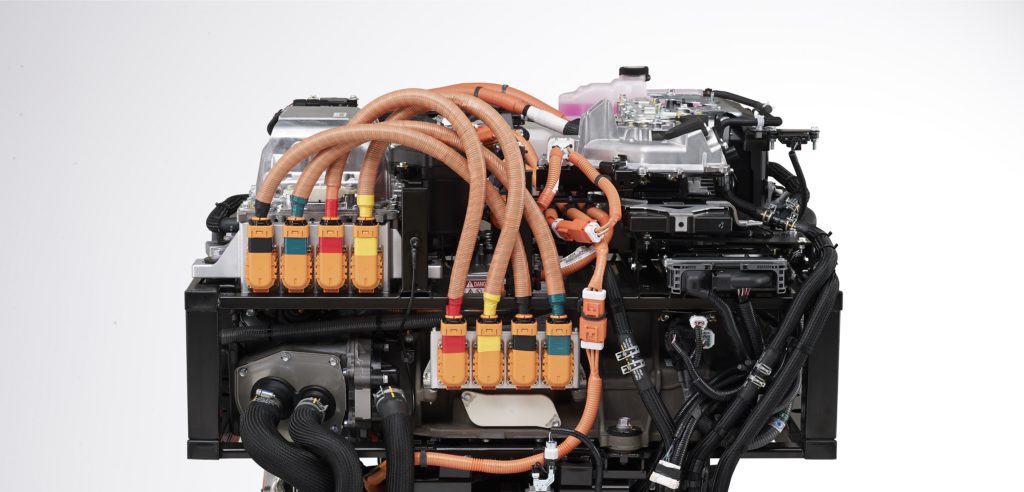Toyota is highlighting its commitment to a hydrogen future by announcing a series of measures designed to improve infrastructure and supply chains, as the automotive industry continues to increase its interest in the zero-carbon propulsion technology.
The carmaker’s European arm has established a Fuel Cell Business Group to oversee hydrogen activities across the region. Based in Brussels, it will strengthen the business case for hydrogen and support its introduction into mobility and other fields, making it accessible to new commercial partners.
To accelerate hydrogen’s widespread take-up, Toyota will focus on hydrogen ‘clusters’ or eco-systems in European centres where local infrastructure is supporting transport fleets and mobility services. It believes activity like this will drive demand for hydrogen, bringing down costs and strengthening the viability of the supply infrastructure, which in turn will attract more customers.
Through the new Fuel Cell Business Group, Toyota will work closely with industry partners, national and regional governments, and organisations to stimulate the development of hydrogen eco-systems in more locations and progress towards the goal of a hydrogen society.
Speaking at Toyota’s Kenshiki forum last week, Thiebault Paquet, director of the Fuel Cell Business Group, said: ‘The benefits of hydrogen are clear. That is why we expect our global sales of fuel-cell systems to increase by a factor of 10 in the short term, and why we have dramatically increased our production capacity.’
Wider field
In addition to its movements in Europe, Toyota is also joining the Japan Hydrogen Association (JH2A), a new entity aiming to promote the global collaboration and formation of a hydrogen supply chain.
The new organisation aims to maintain Japan’s lead in the development of hydrogen systems for various markets, including automotive. Both Toyota and Honda were leaders in hydrogen research for mobility, although the latter dropped out of the market before bringing its Clarity concept model to sale.
‘As part of our various efforts to contribute to the mitigation of global warming through the reduction of CO2 emissions, Toyota will actively make efforts together with our JH2A colleagues to realise the JH2A’s purpose of establishing a hydrogen society at an early point,’ the carmaker said.
Model launch
These involvements in hydrogen society come as Toyota launches its second-generation Mirai. The first-generation model was one of the first hydrogen-powered cars to come to market.
A priority of the new model has been to improve its driving range compared to the first-generation version. Increased power and hydrogen fuel capacity, improved efficiency and better aerodynamics all contribute to extending the driving range by 30% to around 400 miles.
Improvements have also been made to the fuel-cell stack, allowing it to sit on the new GA-L platform and use space more efficiently. A smaller but more efficient lithium-ion battery has also been included.
Increasing awareness
Toyota’s moves follow an announcement last month that Hyundai and market newcomer Ineos had signed a memorandum of understanding to explore new opportunities and accelerate the global hydrogen economy. The agreement also includes the evaluation of Hyundai’s proprietary fuel-cell system for the recently announced Ineos Grenadier.
BMW is also exploring hydrogen deployment, while in Germany, some states are looking at creating a hydrogen economy to take advantage of the zero-carbon emissions. There is also a move to explore hydrogen for heavy-goods vehicles, with Daimler looking to lead the way in this regard. However, the German vehicle manufacturer has ruled out the technology making its way into its passenger cars.
As most carmakers push to launch battery-electric vehicles (BEVs) to comply with strict EU emissions targets, the move from development to market means there is now more time for them to research other low- and zero-carbon technologies. Hydrogen has been around for some time, with Toyota starting its studies in fuel cells in 1992. The technology provides short refuelling times and long ranges, making it similar to internal combustion engine (ICE) technologies. However, the only emission is water, therefore making it a viable alternative to CO2 and NOx emitting petrol and diesel engines.



 Schließen
Schließen